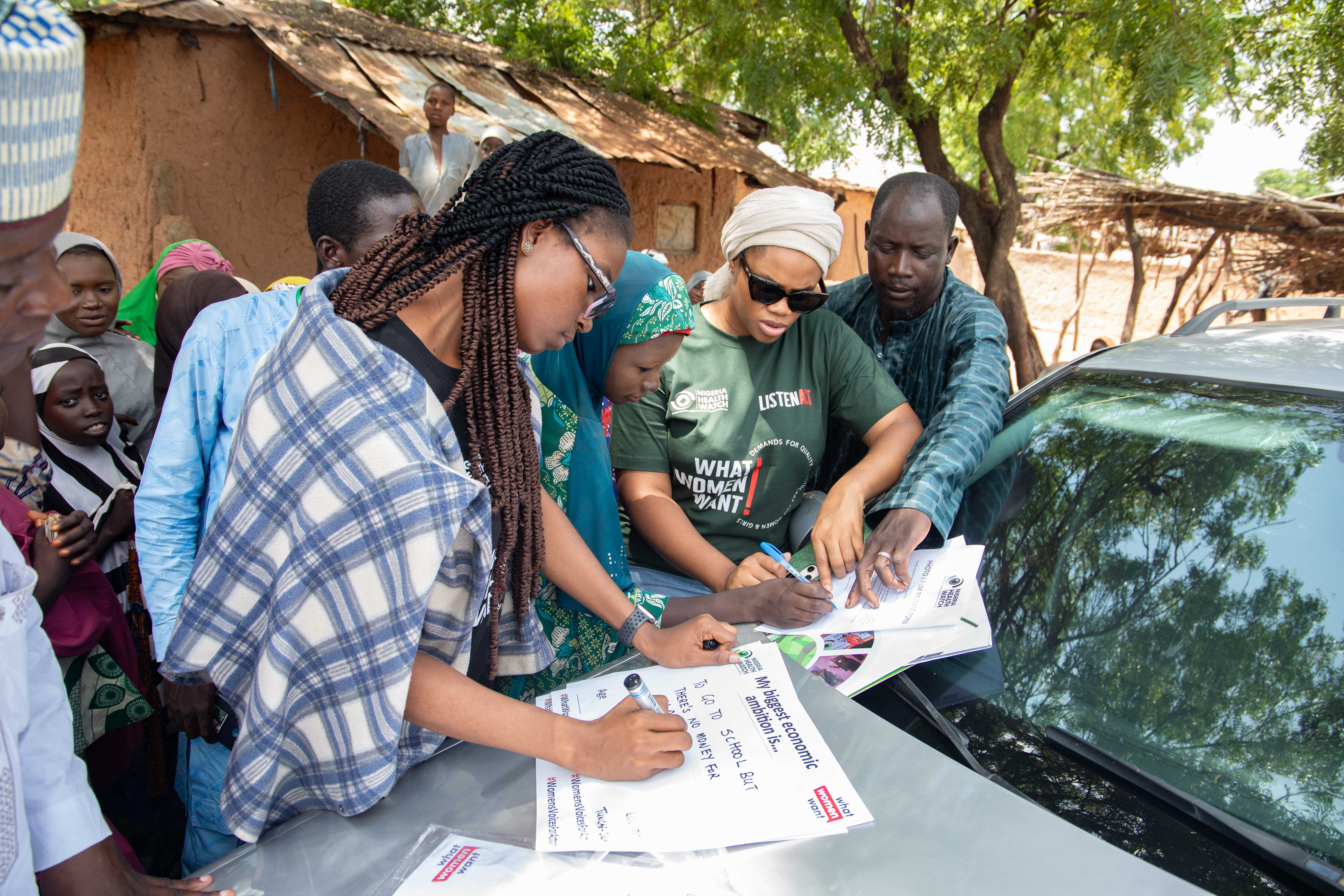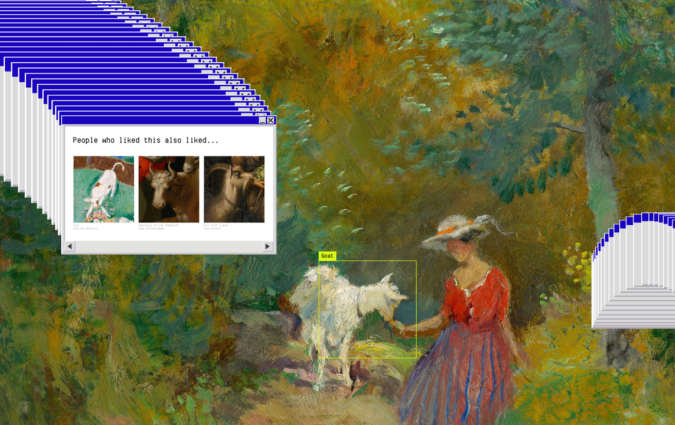This Nigerian nonprofit is empowering health journalists with a focus on solutions and community outreach

The team of Nigeria Health Watch during one of their outreach activities in northern Nigeria. | Photo provided by Nigeria Health Watch
Nigeria Health Watch is pioneering solutions journalism in Nigeria and providing opportunities for journalists and newsrooms across the country. The project, launched in late 2020 with the Solutions Journalism Africa Initiative, was implemented in partnership with the Solutions Journalism Network, a US-based nonprofit that advocates for an evidence-based mode of reporting on the responses to social problems.
The network supports journalists and newsrooms in Nigeria, Kenya, Rwanda and Uganda through an Africa initiative. This three-year partnership, which ended last year, provided formal training and learning resources to 60 newsrooms and built a network of solutions journalism-focused fellows, trainers and media entrepreneurs across the continent.
Nigeria Health Watch led the Nigerian side of the project, which helped train and support newsrooms and freelance journalists across the country to investigate and report on how people are responding to various social problems.
“We are mindful of the fact that it's not just about problems,” said Chibuike Alagboso, who led the initiative and serves as deputy director of media programmes at Nigeria Health Watch. “There are also people who are working to fix those problems and trying to change the narratives be it individuals, organisations, and even governments.”
Alagboso said solutions journalism has always been a huge part of their work at Nigeria Health Watch through news articles, analysis, features and other multimedia output.
“It's always been inherent in our strategy of not just looking at problems, but also looking at what's working,” he said. “Our articles from even years ago highlight the people who are making an effort to address issues in the health sector.”
Connecting newsrooms
The solutions journalism project also facilitated engagement with newsroom leaders. “You can work with a journalist, but if the editor says the story won't fly, it won't fly,” Alagboso said. “We sort of took that top-down approach. We engaged with the management, got their buy-ins and they nominated three journalists that we trained.”
After the training, the journalists were supported through mentorships to apply the solutions journalism framework to produce stories through seed grants. Alagboso said more than 90 journalists from 30 newsrooms were trained as part of the project.
“Some of them were hearing about solutions journalism for the first time,” he said. He explained they have always been deliberate about growing a “community of champions for solution journalism.”
The first phase of the project ended last year, but was extended again for another 18 months The extension’s goal is to consolidate gains made in previous projects.
Alagboso said they put out calls for expressions of interest from newsrooms, ensuring that there was equal representation from all media outlets in the country. They introduced a couple of activities for the new phase of the project.
Among these activities are solutions journalism meet-ups, organised last year across the country. “We did the meet-ups and informal training meetings where we had relaxed conversations with journalists about solutions journalism,” he said.
Alagboso said they are planning training targeted at editors later this year: “We understand how these things work. Editors make the decisions. So, if they don't even understand the need for this, or even how to edit those articles, the journalists might have a hard time publishing them.”
A collection of solutions
This was not the first initiative in which Nigeria Health Watch focused on solutions journalism. In 2018 they launched the Torch Light Series, a collection of articles written with a solutions focus. The articles were usually 1,000 words long and each story identified a problem and one or more strategies addressing the problem.
The outlet expanded on the series with the launch of the Torchlight Africa Series which focuses on telling solutions stories across Africa, with the focus on Nigerian states such as Borno, Kaduna, Kano, Lagos and Abuja, and with pieces on polio, immunisation, nutrition, family planning and reproductive health. More recently, the topics were expanded to include infectious diseases, water sanitation, reproductive health and rights and other issues.
Nigeria Health Watch has published pieces on community accountability mechanisms for quality healthcare in rural areas and on how to improve maternal health through increased access to contraception. Other stories have featured how to improve immunisation, boosting nutrition, reducing maternal mortality and how a breast milk bank gives babies a chance at life.
Alagboso said the whole idea for the Torchlight Africa series is to learn what works in other African countries. For the series, foreign journalists living in those countries are commissioned to do solutions journalism stories.
Most of the articles published in Nigeria Health Watch are written by 20 in-house writers, including two full-time health journalists. Freelancers sometimes contribute pieces depending on the needs of the publication.
A multimedia platform
Launched in 2015, Nigeria Health Watch uses multimedia platforms to disseminate health information and advocate for Nigerians to be better informed. The organisation produces radio and video content in addition to a podcast series to discuss and highlight important health issues.
In February 2023 they launched the podcast Break It Down, which focuses on core healthcare issues in Nigeria. Guests on the show are hosted by in-house staff who have expertise on health topics. Journalists from Nigeria Health Watch regularly appear on radio stations across the country to discuss health topics like obesity, malaria and changing health patterns.
Alagboso said the podcast is in alignment with the idea of helping people understand complicated health issues and technical jargons.
“The idea was really to discuss these issues in a way that they are easily relatable, so we can understand these things, engage better and use that information to demand for better healthcare,” he said.
Reaching rural audiences
Vivianne Ihekweazu, the managing director at Nigeria Health Watch, said rural communities experience real healthcare challenges and it's important they have the right information to make informed decisions.
For example, they started a community health watch project which shares stories from people in local communities. “We've trained community health watch reporters in some communities and they are now the ones who collect some of these stories from people in their communities. Many of them do not really have a platform or even the ability to voice their experience of healthcare delivery and healthcare access,” she said. “Through this community health watch project, we now have community-based reporters who are in those communities, which is of course a great benefit.”

Ihekweazu said they publish these community-based stories to reach a much wider audience, especially decision-makers and policy leaders. “To make sure the community has a voice within their community to share their experience, we hold town hall meetings where people in the community can come face to face with people who have a responsibility for delivering healthcare,” she said.
Ihekweazu noted that they organise community surveys where people in communities can share their perceptions and experience of accessing health care.
The challenges ahead
Ihekweazu said the main challenge for the organisation has been that of workforce – hiring people with the required skills, due to the unique work they do in health advocacy and communication.
“The work we do depends on people because they are the ones who generate knowledge,” she said. “It's difficult to recruit people with that specific skill set. You don't find it off the shelf. We've often had people who come in and it's only through working in the organisation that you now train them up, and then they now learn and understand the way we do our work.”
Working with bureaucracy in the health sector and adapting to transitions that come with new leadership changes are two challenges they also face. “You are now in the work of almost having to build a relationship, and also bring them back up to speed when something changes. But that's inevitable.”
As a grant dependent organisation, she added being able to get funds that actually are enough to keep the organisation going is another headwind they deal with: “Putting it very bluntly, without those grant funds, you can't sustain yourself, but we've been actually fortunate in that sense since our inception.”
The organisation and their communications and solutions journalism projects receive funding from donor nonprofits, including the Solutions Journalism Network, Bill and Melinda Gates Foundation, MSD for Mothers focusing on maternal health, UK-based Coalition for Epidemic Preparedness Innovations (CEPI), the U.S Center for Disease Control among others.
But Ihekweazu said funding remains a challenge, as you constantly “have to ensure that you have the funds to keep you going. But I don't think this is unique to us. Most nonprofits face similar problems.”
In every email we send you'll find original reporting, evidence-based insights, online seminars and readings curated from 100s of sources - all in 5 minutes.
- Twice a week
- More than 20,000 people receive it
- Unsubscribe any time
signup block
In every email we send you'll find original reporting, evidence-based insights, online seminars and readings curated from 100s of sources - all in 5 minutes.
- Twice a week
- More than 20,000 people receive it
- Unsubscribe any time







